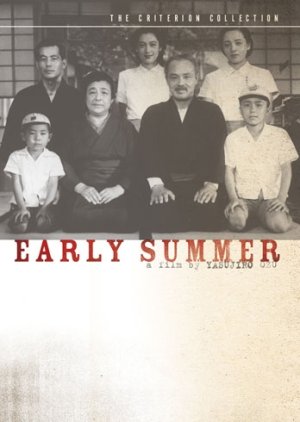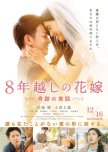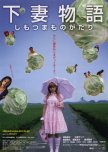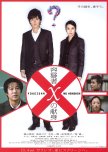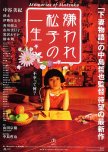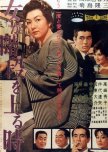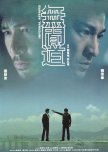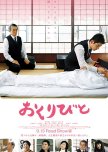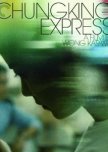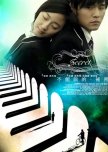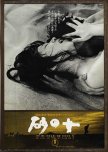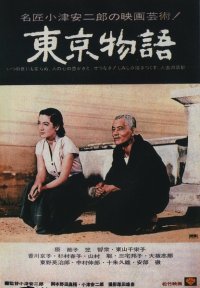
Marry a good person, that's the most important thing.
I thought it would be like Late Spring (1949) and yeah in the first part it's has the same feeling, but after it reaches the second part this film has it own taste, with family problem, and Noriko's family disapproval with her love or future choice make it more hotter than the previous film which feels more intimate.I must say I like this film, this film has more moment that can make me laugh, and with more family member, i can felt the drama. Like when Noriko's gone home after visit Ken's house, then she's telling her family about her decision, the reaction from family, makes me feel connected because she wants to marry a widower, and I've seen one of my family member who still "virgin" marrying a widower, the conflict, the tears I've seen that, and I think Noriko's Love Story maybe end up well.
I don't know what to say anymore, but so far I really enjoy Yasujiro Ozu's films.
Was this review helpful to you?

A moment in tme, The summer of 51!
This is a true slice of life movie depicting a moment in peoples lives as it seemed to be back then, the constant when are you going to get married... single women vs. married women. The family pressure, the nuclear family values and the strong presence of loss in the background. Actually I know very little about this time in history, and even less about the pressures of marriage in 1951s japan so this is actually just me guessing. But this movie does have a feel of moving on without forget ing ones roots... Progressive in many ways, saying women can choose their own paths while still screamin the only way to happiness is marriage.The movie is kind of slow and does get to be a bit repetitive. The subs in the version I watched where a bit a head of their time making me have to use my brain a little bit to much.
If you are in to slow classics with a hint of woman can, this is not a bad place to find it.
Personally had it not been part of the syllabus for a course I am attending, I would probably not have stuck around to the end of it as I honestly did not really care if she would marry or who she would marry even if I appreciated the character of the female lead as she is actually kind of fun and cool.
Was this review helpful to you?

This review may contain spoilers
"It's like when you look for something all over the place & then find it right in front of you."
In Early Summer a family faces a time of transition and growth as the twenty-eight-year-old daughter's unmarried status seems to reach a crisis point with everyone wanting her married off, even her boss plays matchmaker! This poor "old maid" seems quite happy enough working, hanging out with her friends, and helping her family, but society norms being what they were, she understands her time of being single is fast running out.Ozu slowly takes his time setting up the characters and family dynamics in his usual aesthetic manner. The plot is not complex but the relationships are. Noriko is the "old maid" and seems fairly nonplussed when her boss tries to match her with an older friend of his. Her authoritarian brother, Koichi, jumps at the chance for her to be married to a wealthy older man. Noriko's mother and sister-in-law express their doubts about the match when they hear the man is forty. Koichi shuts them down saying that at Noriko's age, beggars can't be choosers.
When Koichi's two young sons run away after an argument with their father and can't be found, Noriko goes to a neighbor whose widowed son and small daughter live with her. The son, Kenkichi, goes with Noriko to help her find the boys off-screen. Kenkichi is a doctor and is later offered a promotion from his boss, Koichi, at a provincial hospital. Noriko takes a farewell gift to his house and before she leaves, she and Kenkichi's mother have arranged for her and Kenkichi to be married without his or her parents' knowledge or permission! How terribly forward and untraditional! Kenkichi is delighted, her parents not so much. "She acts like she grew up all by herself." Even though the family knows and respects Kenkichi, he's not wealthy and worst of all, he already has a child. Noriko loves the little girl and can't understand what the problem is.
The father goes to the store and has to wait for a train to pass by. Just like his teapot, trains play a big part in most of Ozu's films. Subconsciously, we know that trains are either taking people to somewhere or away from somewhere. Here the movement within the family is spurred by Noriko making a decision for herself, she's not only moving physically away from her family, but also away from the family's sphere of influence. The father realizes his family is transforming and that the train will soon be taking his daughter away as much as he would love for his family to stay together.
Always hesitant to show much romance, Ozu finally lets Noriko give voice to why she made what looked like a rash decision.
She admits her long standing feelings for Kenkichi. He's someone she trusts and knows she will be happy with. Her best friend reveals to Noriko that what she's talking about is love. Noriko doesn't always come across as the sharpest knife in the drawer with her perma-smile and sunny disposition, but even she knew that marrying a man who had been resolutely a bachelor until forty might make for a difficult relationship no matter how much money he had. Better to clip coupons and work on a blended family as a stepmother with someone she cares for than to be on unequal footing with an older stranger.
"It's like when you look for something all over the place, and you find it was right in front of you all along."
The acting in this film was uneven for me. It was interesting seeing Ozu regular Ryu as the older brother with jet black hair. Two years after this film, he would play an elderly father role with the actress who played the mother in this film in Tokyo Story. In Tokyo Twilight he played Hara's father! I have a love-hate relationship with Hara Setsuko. When she's given the chance to show a range of emotions, I find her compelling. I have a more difficult time when no matter what happens on screen, whether she's been offered congratulations or told she has six months to live she responds with the same smiling face. It can feel like a mask hiding the character's true emotions and I would like to see the depth of the character played out more.
Single, childless Ozu has more than once had two young brothers in his films, Good Morning and I Was Born…But, come to mind. In the films I've seen thus far, and also in this one, the boys are very disrespectful, selfish, and throw fits on a regular basis. Maybe it's because the kids always seem cooped up in the house like the caged birds in this film that they go stir crazy. More than likely, it's how someone who is childless sees children, but I find the children in his films can cross the line from delightfully realistic to incredibly annoying. There was a some of both in this film.
Unlike some of Ozu's older films where tradition must be maintained in the family and with fear of modern influences damaging the familial structure, Noriko is not punished for making her own decision regarding her future. No train runs her down nor is there a disaster to her reputation. I found this different direction with more sympathy toward the young people by the director a breath of fresh air.
Just like the sunny, carefree days of summer seem as if they will last forever, we know fall is around the corner. It doesn't mean the end of the world but it is a time of transition, even as Noriko's family had to accept that change is inevitable. Life is always in flux and families have to be flexible. Much like the family portrait taken in the film with the parents and their children and grandchildren, the last photo is only of the parents. In time, most parents will see their children move out to make lives of their own and be left by themselves with a much quieter house.
After Noriko is wed, again off-screen, and her brother and his family have moved due to his job, her parents talk about their lives. The father laments, "I wish we could live together forever, but that's impossible." On reflection they realize that they have lived a good life and raised their children well. They have earned their, if not happy, at least pleasant and contented ending.
2/23/23
Was this review helpful to you?

The weight of family expectations, oh how heavy.
Although the three Ozu films {Late Spring, Early Summer, and Tokyo Story} are not connected in story, we see many of the same actors, and the female leads -all named Noriko - are played by Setsuko Hara. Across the three films, we experience similar family and societal conflicts and a consistent visual style, film pace, and sleepy music. There's a familiarity and continuity despite all three films being distinctly different stories. The films were made in in close chronological proximity - 1949, 1951, 1953. They're appropriately considered the "Noriko Trilogy" for that connectedness we feel when watching the trio of films.The overall pace of this film is andante (moderately slow). So when there are scenes of anger or lightning quick decisions, we feel those scenes powerfully. Noriko's spontaneous decision to accept an impromptu marriage proposal is profound, shocking, confusing. Can this compliant daughter really act in such an individualistic way is what we wonder. But let it sink in a bit more, and it's all too obvious that the decision makes sense. We're given clues about the 'cost' of social obedience. Noriko's unkind brother and forlorn sister-in-law are moving along with their arranged marriage as puppets in a play. Noriko has enough experience with the type of man she doesn't trust; her brother is unkind and controlling; her boss is flirty; her suitor, Mr. Manabe, sends a private investigator to research her - wouldn't we feel a bit slimy after that? The filmmaker teases us by not even showing us what Mr. Manabe looks like; who cares if he's rich and good looking? Noriko's selection of Yabe is somewhat by process of elimination. She even argues that she doesn't 'love' him and instead 'trusts' him. He's the one to accept her individuality, the one she can lean on for support rather than take instructions from.
Noriko's independent decision, without consulting family - or even the groom! - is symbolic of a change or breakdown in the social order. Post WWII, Japan was grappling with many societal changes. Even the films that Ozu made were subject to intense censorship by American authorities. It's even comedic that Ozu chose a young woman making a choice for themselves as the symbol for social order breakdown; how dare a woman do that! I suspect Ozu's sympathies lay with Noriko, with individuals, and felt it was important to highlight individuals' livelihoods. When people are lumped into groups, we may come away with dangerous biases and generalizations, not only beliefs about others but also beliefs directed inwardly. Certainly, many Japanese did not want to fight in the wars, but were forced due to the social order; it was not acceptable to go against the rise in nationalism. Ozu, it seems, welcomes this social order breakdown. Yet, in that breakdown, there are things to lament, things that are lost. Noriko will move away from her family; her parents will move away as well to live with their elderly uncle. Like a wistful wind, the family is dispersed to far places in Japan.
Many of the actors in the Noriko films play different characters, roles, with wide ranging temperament. Chishu Ryu is a gentle, middle-aged father in Late Spring, a brusque and dominant elderly brother in Early Summer, and a resigned grandfather in Tokyo story. It's in watching his range in all three films where we fully understand the actor's skill, and long-lasting collaborating with Ozu (he appears in 52 of 54 Ozu films and featured in over 160 films and 70 television productions). Chishu's forceful manner in Early summer is quite enjoyable because of the contrast to other roles. It's a breath of fresh to see him in something other than a docile, fatherly figure. Setsuko Hara, on the other hand, maintains a continuity in character and affect. There's a stubborn purity to Noriko; when her purity survives, it is satisfying and comforting, but when it is broken, it is heartbreaking.
What exactly did Noriko represent to Ozu, Japan, and to the broader film audience of the of 1940s and 50? What does Noriko mean to us now in 2023? This is, in part, the beauty of the Noriko films, that it elicits so much reflection at a broad, universal level.
A loaf of bread loses its dignity in this film.
Was this review helpful to you?

